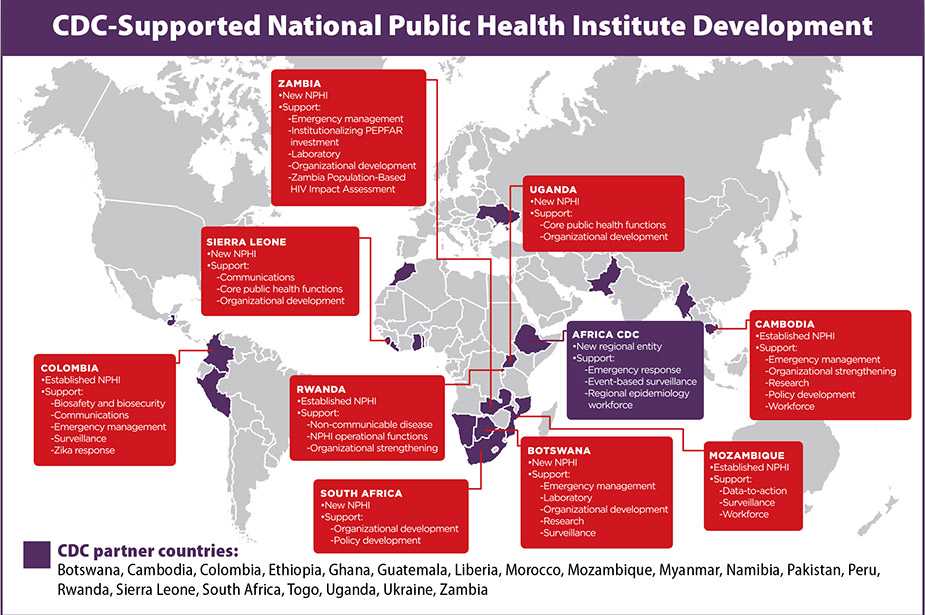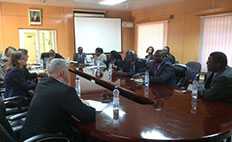Strengthening National Public Health Institutes Globally

Prevention, detection, and response to public health emergencies, requires every country to be equipped to carry out a set of functions that are the cornerstone of strong public health systems.
Many countries consolidate these functions organizationally in a national public health institute (NPHI) – a science-based organization, or network of organizations, that provides leadership and coordination for public health at the national level. In most cases, the NPHI is part of the government, usually within or attached to the Ministry of Health. NPHIs promote evidence-based decisions, policies, and programs, and become the logical partner in government-to-government public health relationships.
CDC is helping to establish NPHIs in other countries. This assistance includes linking governments with an existing NPHI in another country or with U.S. State Health Departments. As of December 2016, CDC was supporting 20 countries to either develop or strengthen their NPHIs.
New and stronger NPHIs are developing in both high- and low-resource countries. During times of emergency, the need for NPHIs becomes most apparent because leadership and timely reliable data are critical for an effective response that saves lives. For example, following the Ebola outbreak which devastated Sierra Leone from 2014 to 2015, the country determined that establishing an NPHI would help improve its response to future outbreaks.
Since August 2016, DGHP experts in Workforce and Institute Development and others from across CDC, have been working with Sierra Leone’s Ministry of Health and Sanitation to help establish the Sierra Leone National Public Health Agency (NPHA). With an NPHA, the government will be able to detect and respond to public health emergencies more effectively, increase the likelihood of controlling public health problems at their source, and enhance global health security.

Stopping cholera early requires a strong national public health system, and this is part of the vision of the new Zambia National Public Health Institute (ZNPHI). A response to a 2016 cholera outbreak gave ZNPHI the opportunity to identify strengths and set priorities as it develops Zambia’s first Public Health Emergency Operations Center (PHEOC).
Left: Representatives from CDC, the International Association of National Public Health Institutes, and ZNPHI meet with Zambia’s Disaster Management and Mitigation Unit.
A Stronger National Public Health Institute Helps Colombia Tackle Zika Virus and Other Health Threats
Colombia knows first-hand the benefits of a strong NPHI. When Zika hit the country in October 2015, the Instituto Nacional de Salud (INS), with support from CDC and the International Association of National Public Health Institutes (IANPHI), was ready to provide leadership and coordination for the response at the national level. INS rapidly mobilized staff to contribute to the response and ensured necessary supplies got to where they needed to be in time. Additionally, engagement with the media, a key component of the response, highlighted INS’s critical leadership role in Colombia’s Zika response.
Before Zika hit, CDC and IANPHI were helping INS improve its biosafety, biosecurity, and surveillance systems. The project also included risk communication training, which taught INS leaders how to be empathetic and to go beyond the technical aspects of the disease and emphasize sharing important public health messages for behavior change.
“CDC and IANPHI have helped transform our institution. We are increasingly transparent and open. We are striving to advance public health in Colombia by engaging with experts, the general public, and all the groups that depend on us for information and guidance in ways that meet their needs,” said Dr. Martha Lucía Ospina, INS Director.
Strengthening the INS in Colombia increases its capacity to rapidly detect and respond to disease outbreaks, such as Zika. Outbreaks may continue to occur in or around Colombia but the country now has the systems and expertise to keep itself, and the world, safer and healthier.
- Page last reviewed: March 31, 2017
- Page last updated: March 31, 2017
- Content source:


 ShareCompartir
ShareCompartir